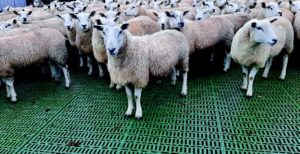Farming 700-acres in Anglesey, Jack Foulkes alongside his father, John and their two full time employees run 2,700 ewes (1,400 Suffolk x Mules, 600 Scotch ewes and the rest Texel crosses), lambing at the end of January. As the land is heavy clay based, ewes are housed by the end of November to give the land a rest; ready for the new year and cycle.
The farm have invested and are currently expanding the slatted shed space where ewes are housed on slats for a period of time before they lamb down. “We have had slats for 12 years, we’re happy with the performance and they work for us. They help rest up the pasture and also keep costs in check; without having to send off animals on tack and also bedding” Jack comments.
The farm’s NWF Sales Specialist, Huw Lloyd-Roberts has been working with Jack and the team for around 12 years. “One of the first things we do each season is analyse the silage, this enables us to determine the rate of supplementary feed that needs to be provided at each stage of pregnancy and into lactation” Huw comments.  The silage is also tested throughout the season allowing adjustments to be made as the unit works through the pit. Marchynys feeds ad-lib silage and NWF’s top-quality ewe roll from 8-3 weeks prior to lambing depending on their litter size. Supplementary feed rates depend on silage analysis but typical feed rates are shown below:
The silage is also tested throughout the season allowing adjustments to be made as the unit works through the pit. Marchynys feeds ad-lib silage and NWF’s top-quality ewe roll from 8-3 weeks prior to lambing depending on their litter size. Supplementary feed rates depend on silage analysis but typical feed rates are shown below:
• Triplets get up to 1kg/day, which is worked up over 8 weeks.
• Twins get up to 0.7kg/ day over 6 weeks.
• Singles get around 0.35Kg/day in the last 3 weeks of pregnancy.
They had improved the nutrition of the ewes which resulted in an improvement of colostrum quality and quantity. “The vet took bloods from the lambs to assess colostrum absorption, the results speak for themselves as we are still using the diet 4 years on” Jack comments. NWF Sales Specialist Huw, comments that “by feeding and looking after the ewes during this time, they are able to look after themselves for the rest of the year”. Jack says “although we get very little metabolic incidences (3 twin lamb disease last year out of 2,700 ewes), the ewes affected will never fully recover and ultimately cost the system”. He also then explains that “sheep have changed over the years, the demand from that ewe is greater and we must manage her accordingly”.
Around two days after a ewe has lambed, she is then turned out onto the rested pasture and depending on the weather and the season, will get supplementary feed. “We do not plate measure or record grass growth as such, but we know if the sward is below 3-4cms, they need some supplementary feed. Plus, the ewe’s will also tell us if they need some rolls!” says Jack. In the field, the lambs have creep feed from 4 weeks onwards, NWF’s Fast Lamb Pellets which is a high quality, energy dense starter diet. Lambs are sold off the ewe from 12-16 weeks of age depending on the season and all go to Tesco. “We target a 42kg lamb, to average a deadweight of 19.5kg”. By the end of July, anything which is left will be weaned, which is roughly 25% of the lamb crop.
Marchynys have a replacement rate of 20%, roughly 260 ewes each year are homebred from the Scottish Mules. The other half are sourced from Thame Sheep Fair. Jack analyses the lambing data they gather each year and only buys ewes from flocks which have performed well in the past, with a known health status.
For the future, Jack wants to continue to increase the farm’s efficiency and improve their carbon footprint. By being part of the Tesco supply chain, the farm is involved with group meetings where there is increasing discussions about sustainability and carbon, something as a business and farming system the team at Marchynys will be looking at.
NWF would like to thank Jack and the team at Marchynys for the insight to their system and wish them all the best for the coming lambing season!
For further nutritional advice on maximising your ewe and lamb performance, speak to your local NWF Sales Specialist, or get in touch on 0800 756 2787. If you want to feature in one of our bulletins, please let in touch with our marketing department, marketing@nwfagriculture.co.uk

